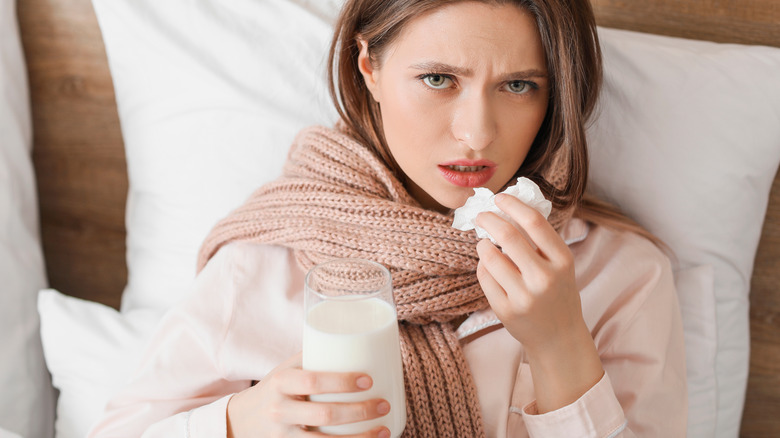What Happens If You Drink Milk When You're Sick
When 12th-century Jewish physician Moses Maimonides' treatise on asthma noted that milk caused "a stuffing in the head," he probably didn't think the conversation would continue in the 2000s. But here we are, debating this age-old topic.
Those who believe that dairy makes cold or sore throat symptoms worse mainly refer to feeling an increase in mucus production upon consuming milk. To them, drinking milk when they're sick results in sticky, stuffy, and phlegmy congestion at the back of their throats. From being called and old wives' tale to being embraced as the holy grail in households, "the milk makes your cold worse" idea has seen a gamut of reactions. What exactly happens if you drink milk when you're sick? Is it one of the worst drinks to consume if you have a common cold?
The scientific evidence is a little nuanced, but health professionals generally believe that there's nothing unsafe about drinking milk when you're sick. Let's take a look at the science behind it all. One study done as far back as 1988, which looked at 60 volunteers challenged with rhinovirus-2, found no difference between the 30 participants who consumed milk and the 30 who didn't. A 2005 study done on the subject, albeit on people with asthma, had similar results. Before you start wondering why there is a debate at all, there is more data to look at.
Does drinking milk really make cold symptoms worse?
People who noted an increase in mucus secretion from the Lister Hospital in Stevenage, U.K. (26 men and 82 women, to be exact) were recruited for a 2018 study (via The Daily Telegraph). For the first two days, all of them had a dairy-free diet. From day three till day six, however, half of them were asked to consume some full-fat cow's milk daily, while the others had soya.
The results showed that all participants self-reported a decrease in mucus levels after the first two days of going dairy-free, but the cow's milk group reported a significant increase in symptoms during the rest of the trial, while the soy milk drinkers continued to report reducing mucus levels.
"This was quite a big effect in a relatively short space of time," Dr. Adam Frosh, a consultant ear, nose, and throat specialist at Lister Hospital who was involved in the study, shared "It's reasonable to conclude that anyone who feels milk increases their mucus production should consider reducing their dairy intake, or try a dairy-free diet, to see if it improves their symptoms."
Does milk really increase mucus production?
This is the main question on everyone's lips. Is it actually true that milk increases mucus production, or are self-reporting volunteers of studies just "feeling" like it does? Pediatric sleep medicine specialist Dr. Julie Baughn thinks that it could be the latter, per Mayo Clinic.
Mucus is our body's response to inflammation, in very basic terms, and is produced in the lung and upper airways. "During a cold, mucus in the nose and throat gets thicker," according to Baughn. "It contains trapped germs and the proteins and cells the immune system sends to clear out the germs." It is possible that people who drink cow's milk when they have a sore throat or cold could be misreading the way the liquid coats their mouth as an increase of mucus levels, shared the pediatrician. "When milk and saliva mix in the mouth, they create a somewhat thick liquid that can briefly coat the mouth and throat. The feeling that lingers may be mistaken for extra mucus."
There is also a theory that a protein found in cow's milk, beta casein-A1, can stimulate gut mucus production (per Food and Behavior Research), but it's hard to see how this can cause a phlegmy feeling in the throat. Ultimately, it looks like there's no need to fear a glass of milk before bed if you're feeling sick (unless you're lactose intolerant, of course). It could even provide the nutrients you need when you're sick.


